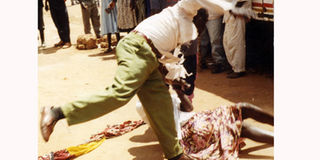NGO call centre offers hope to gender-based violence victims

Violence. A man beats a woman. Alebtong women have resorted to using a toll-free call-centre to report cases of gender-based violence. PHOTO | FILE
Women and girls in Alebtong District have resorted to using a toll-free call-centre to report cases of gender-based violence and economic exclusion during the lockdown.
Restless Development, a global advocate for youth-led change, set-up call-centres in six districts in the country and donated them to the government.
The districts are Alebtong, Buyende, Lira, Kamuli, Tororo and Bukedea.
Today, the six established call centres serve as a channel for girls and women to report cases of abuse which have been on the rise during the lockdown.
Ms Fiona Amony, 23, has been volunteering at the call-centre in Alebtong District giving fellow young women an audience to report abuse.
“I came to volunteer out of the need to offer fellow girls and women an ear to share their experiences during this lockdown period where many of them have been going through hard times but with no one to confide in,” Ms Amony said.
Within a month of manning the call centre, Ms Amony had filed more than 100 cases mainly from the youth between the ages of 20 and 30 who reported gender-based-violence related incidents such as sexual assault and harassment.
Other cases related to economic injustice such as employers failing to pay salaries, making it difficult for women to support themselves through the lockdown, were also reported.
Ms Amony says she also receives calls of distress from young men.
Ms Jennifer Okello, a resident of Alebtong, who called the centre to ask for assistance, says: “I feel so happy that whenever my husband abuses me, I can just telephone the call centre.”
The process is designed in a way that upon receiving the calls, Ms Amony records the complaint in a case file and forwards them to the relevant government offices for follow-up.
This sometimes takes days or weeks during which a lot happens.
One particular call from a teenage girl has remained on Ms Amony’s mind. It is a daily reminder of what young people are braving during the lockdown even as the government focuses efforts on tackling the pandemic and its direct consequences.
“She called and spoke with a teary voice. She had been working with a hotel in Alebtong town but her boss refused to pay her, on grounds she had been ‘undisciplined’ at work,” Ms Amony says.
It soon turned out that the girl had rejected sexual advances from her boss and in retaliation he was denying her payment.
Days later, the poor girl ran away from the hotel making it difficult to follow up the case with relevant authorities, Ms Amony adds.
“Advocacy faces many barriers including government bureaucracy in investigating and addressing cases as fast as possible. Ultimately, delayed justice often becomes justice denied. Nonetheless, we cannot give up on giving young people a voice,” she notes.
In Alebtong district, Fiona is now a well-known icon spearheading the advocacy for workplaces that are free from sexual harassment.
Despite what sounds to be a busy schedule dominated by voluntary advocacy, the young Fiona still finds time for her studies. She is currently a third-year student pursuing a degree in public administration and management at Lira University.
Issue
Uganda has been under lockdown since March, in a bid to curb the spread of the coronavirus.
So far, the disease has killed nine people out of more than 1,100 cases confirmed by the Ministry of Health.
However, there have been a number of challenges that have been faced in other spheres of life as a result of the lockdown. As the economy remained down for months, the youth hitherto in some sort of employment found themselves economically crippled with their livelihoods suspended.
Girls and young women have been most vulnerable during the lockdown with appalling media reports that at least 2,300 school girls were impregnated while 128 others married off during the lockdown.




